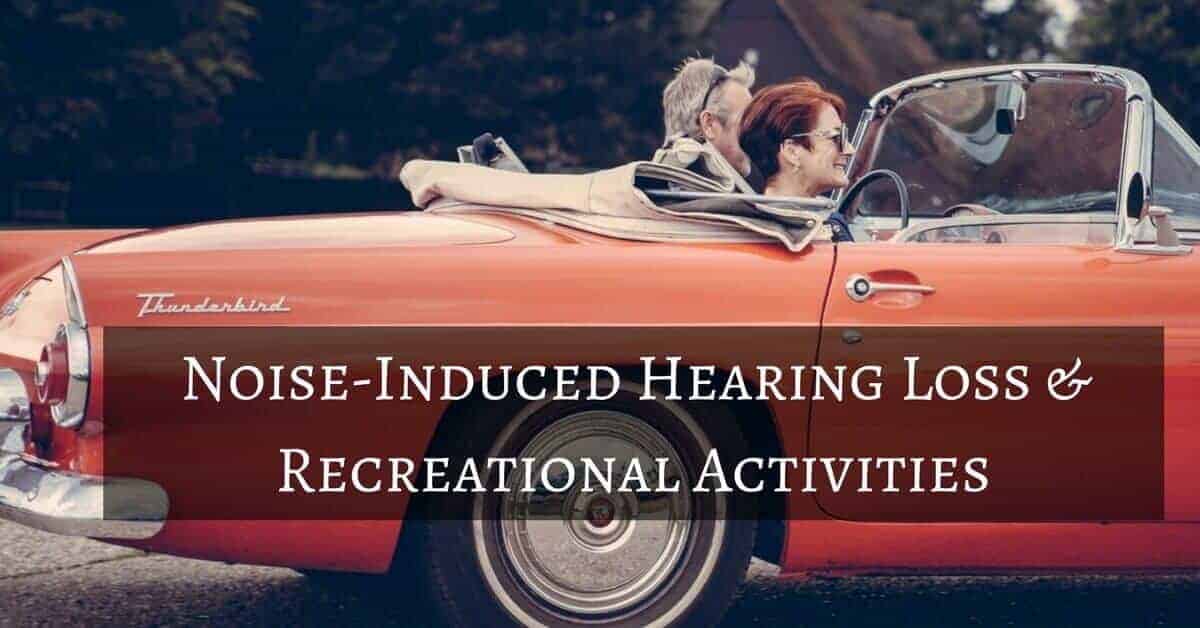Exposure to noise is one of the most common reasons for hearing loss, and considering one in ten Americans experience hearing loss, it’s definitely something worth talking about.
What is noise-induced hearing loss?
Noise-induced hearing loss is, essentially, hearing loss that is caused by frequent or intense exposure to loud noise. Frequent exposure to loud noises in the 85-100 decibel range (garbage trucks, for example) or a one-off experience of a very loud burst of noise in the 110-140 decibel range can cause noise-induced hearing loss.
So, what does that have to do with recreational activities? Recreational activities are often what we look forward to during a long day at work or on a rainy day. However, there are several activities you may enjoy that could put you at risk of hearing loss.
Hunting and hearing loss
The noise of a single gunshot is equivalent to the noise emitted from a jet engine, falling well within the 110-140 decibel range – or even higher. A 0.22-caliber rifle will produce sounds around 140 decibels, whereas pistols can get up to 175 decibels!
Hunting, or heading down to the shooting range, can be a great release after a tough day. At the shooting range, most people will wear protective gear, but when heading out into the wilderness, many hunters opt to leave this gear at home.
It makes sense that hunters would feel the need to be alert and to have full faculty of their hearing abilities, to be able to listen out for animals. Nevertheless, it is important to keep in mind that a one-time exposure to noise at this level can result in permanent hearing loss. In addition, avid hunters will be particularly at risk, as frequent exposure to noise at this level is even more detrimental.
Given the way hunting and shooting works, the exposure to gunfire noise means that people who experience hearing loss as a result of this recreational activity often struggle to differentiate between certain speech sounds and have difficulties with high pitch noises. It is also more common to experience hearing loss in one ear, rather than both ears, depending on whether a person is left or right-handed.
The best bet for ensuring that your hearing health stays in good shape is to wear hearing protection whenever you are handling a gun, whether it’s in a shooting range or out hunting deer.
Live performances and steps to reduce noise exposure
Whether you enjoy listening to live performances in person or via your personal audio device, you may be putting your hearing health at risk. Exposure to noise through loud music at gigs, clubs or through your Smartphone has been commonly cited as a potential reason for hearing loss.
Of those who have attended a live performance, an estimated 90% reported that they could hear ringing in their ears after leaving. If you fall into that category, you may have been at risk of damaging your hearing; that ringing in the ears is a warning sign that you’ve been exposed to dangerous levels of noise.
So, what can you do to reduce this risk? Wearing earplugs is an obvious and recommended option, but in addition, it is recommended to take some time out. Step outside for 5 minutes at regular intervals to get a breath of fresh air and let your ears have a rest!
Motorcycling and the dangers of engine and wind noise
Motorcycles can be great fun, but they are definitely noisy, particularly in large groups! In terms of hearing health, they can be less enjoyable for your ears.
The risks of hearing loss from frequent exposure to motorcycles come from both noise from the engine and from wind rushing past.
A recent study at the University of Florida College of Public Health and Health Professions revved the engines of 33 motorcycles and found that about half of those engines measured approximately 100 decibels. It is safe to be exposed to this level of noise for about 15 minutes – but a motorcyclist out for a joy ride is liable to be exposed to this noise for a much longer amount of time, and the noise will only be increased if riding in large groups.
In addition, the wind rushing past as you are riding through country roads can feel liberating, but if you’re traveling at 75 miles per hour, that wind can reach up to 105 decibels!
Although it’d be logical to think that a helmet may reduce the noise from wind, most helmets actually exacerbate the problem. That’s why it’s recommended to wear earplugs underneath a helmet to ensure optimum protection for your ears.
The main takeaway from this article is this: protect your ears! Whether it’s wearing earplugs, reducing your exposure to loud noises, or taking breaks to give your ears a rest, it’s important to think about your hearing health throughout your day and to take steps to prevent hearing loss.
Hearing Wellness Solutions
If you think you may be experiencing hearing loss as a result of your favorite recreational activity, or for any other reason, the hearing instrument specialists at Hearing Wellness Solutions can help. We offer free hearing evaluations, so it really couldn’t be easier to start your journey on the path to positive hearing health.
Contact a member of our team today to schedule your free hearing evaluation, or to discuss any other hearing-related needs.

